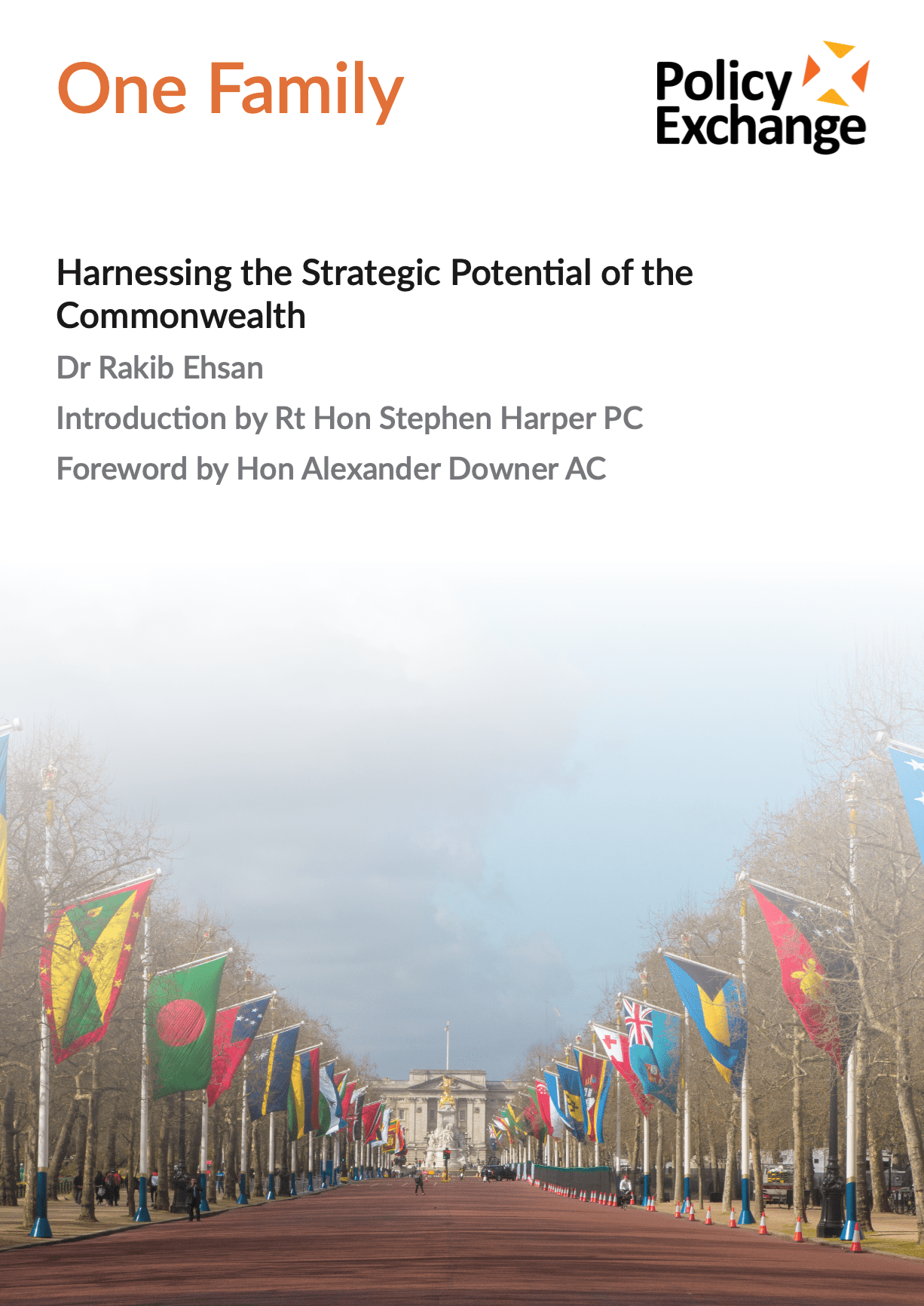One Family
Harnessing the Strategic Potential of the Commonwealth
A new report published by Policy Exchange, One Family: Harnessing the Strategic Potential of the Commonwealth, presents the case for a more dynamic, relevant, and cohesive Commonwealth of Nations which builds on its existing advantages in areas such as trade and investment. It also identifies environmental protection, education and social mobility, and security and defence, as other areas where co-operation between its member countries can be deepened. The report encourages the new UK Government to recognise the Commonwealth’s strategic value and the Association’s potential to be a shining beacon of international collaboration based on the central belief that stability and security are the integral foundations of sustainable economic development.
The report includes an introduction by the former Prime Minister of Canada, the Rt Hon Stephen Harper PC, and a foreword by the former Minister of Foreign Affairs of Australia, Hon Alexander Downer AC. Receiving cross-party support in the UK, the report has been endorsed by the Chair of the All-Party Parliamentary Group for the Commonwealth, Andrew Rosindell MP (Conservative MP for Romford) and its Co-Chair Adam Jogee (Labour MP for Newcastle-under-Lyme).
The report also includes groundbreaking multi-country polling carried out on Policy Exchange’s behalf by British Polling Council (BPC) member Opinium – incorporating the UK, India, Nigeria, Australia, and India. It examined public attitudes towards the Commonwealth of Nations and explores what people think it should prioritise in terms of future co-operation between its members.
Some of the key survey findings include the following:
- More than three in five UK adults – 63% – believe that the Commonwealth should encourage the removal or reduction of barriers to trade between its members.
- Nearly three in five UK adults – 58% – are of the view that the Commonwealth should support its members to reduce their economic dependence on financial investment, loans, and goods imports from countries such as China.
- A comfortable majority of UK adults – 66% – believe that the Commonwealth should support its members to reduce their dependence on military and security investments made by Russia.
- Nearly half of UK adults – 49% – think that the Commonwealth should invite Ukraine to submit a membership application.
- UK respondents were the least likely to agree with the view that the UK does more good than harm in the world (47%). The highest level of agreement was found in the polling for India (59%), followed by Nigeria (51%), Malaysia (50%) and Australia (48%).
- Nearly three in five Australian respondents – 59% – believe that it is in their country’s national interest that the Commonwealth focuses more on helping the economic, social, and institutional development of its smaller member countries, with the aim of countering Chinese power and influence in parts of the world such as the Pacific.
- Two in three Australian respondents – 66% – agree with the view that one of the Commonwealth’s objectives should be to limit the international influence of Russia (slightly higher than the UK figure of 65%). There is also majority support for this in Nigeria (59%) and India (57%).
- Against the backdrop of the ongoing Russia-Ukraine conflict, nearly half of the British and Australian publics believe that the Commonwealth’s invitation to Ukraine to submit a membership application is a good idea (49% each). This rises to 55% for Malaysia, 74% for Nigeria, and 75% for India.
The report, which was guided by a dedicated Commonwealth Advisory Board chaired by the 22nd Prime Minister of Canada Rt Hon Stephen Harper PC, makes a total of seventeen recommendations, including the following:
- A new Commonwealth Trade & Investment Commission which makes the most of the Commonwealth’s existing advantages based on a common language and similar administrative systems.
- A role for William, Prince of Wales, to champion environmental causes across the Commonwealth – such as promoting green-energy transitions and stewardship of the oceans.
- The creation of a new Commonwealth Security & Defence Co-operation Forum which encourages joint military and naval exercises as expressions of solidarity with members facing threats to their territorial integrity.
- The adoption by the Commonwealth of a policy of ‘strategic expansion’ in order to broaden its membership into the Middle East & North Africa (MENA) region (with countries of interest including Morocco and Oman).
The launch of ‘One Family’ was covered by:
Related Publications
Authors

Dr Rakib Ehsan
Senior Fellow




